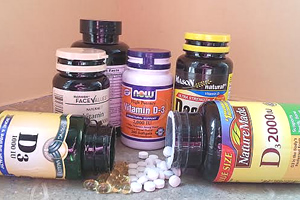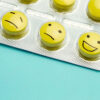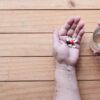My doctor doesn’t suggest a lot of supplements, but she does promote vitamin D3. And I have to admit when I skip my vitamin D3 in the morning, I notice my mood dropping. My internist is very specific about the brand she recommends. Sometimes I follow her advice, sometimes I just pick up some D3 wherever I am.
Last month I came home with a bottle of vitamin D3 that were little white pills and not softgels. I’d only ever seen D3 delivered in softgels, never little white pills, and that got me wondering: What the heck am I taking?
I set the bottle aside until a few weeks later when headlines broke about the State Attorney General of New York testing herbal supplements bearing the names of some of America’s retail giants: GNC, Target, Walgreens and Walmart. 4 out of 5 of the products were found to not contain any of the herbs on their labels. Worse, many had unlisted ingredients that could cause allergic reactions. From the AG’s press release: “Some of the contaminants identified include rice, beans, pine, citrus, asparagus, primrose, wheat, houseplant, wild carrot, and others. In many cases, unlisted contaminants were the only plant material found in the product samples.”
‘I gathered up all the bottles of vitamin D3 in my apartment…. I wondered if they all included vitamin D3 in the amounts listed, without toxicity or contaminants. I realized I didn’t know the answer to those questions or how to discover the truth about these pills and softgels.’
The FDA does not test supplements or investigate manufacturing facilities unless there are complaints. According to the FDA website, “Under DSHEA (Dietary Supplement Health & Education Act), a firm is responsible for determining that the dietary supplements it manufactures or distributes are safe and that any representations or claims made about them are substantiated by adequate evidence to show that they are not false or misleading. This means that dietary supplements do not need approval from the FDA before they are marketed.”
I gathered up all the bottles of vitamin D3 in my apartment: I keep a bottle handy on my desk, in the kitchen, in my bathroom and so on, and took the photo above — those bottles are all from my home. I wondered if they all included vitamin D3 in the amounts listed, without toxicity or contaminants. I realized I didn’t know the answer to those questions or how to discover the truth about these pills and softgels.
I bought an online subscription to Consumer Lab which tests whether a supplement contains the labeled amount, examines the purity of the product and its ability to break apart for absorption. (Who knew this is a common problem with supplements? If the pill or softgel doesn’t break apart in 30 to 60 minutes, it has a good chance of passing through your body completely or partially intact, which deprives you of its benefit.) ConsumerLabs.com has great information, but a subscription is needed for specific brand information. It also doesn’t certify or put a seal on a product and it doesn’t review all the brands in the market. In my group of 6 brands of Vitamin D3, only 2 were reviewed (both received good reviews).
3 of the brands I own have a seal on the label, so I explored what that meant:
- Spring Valley is a Walmart brand and carries a seal that states: Quality Assurance Guarantee Verified by an independent ISO 9001:2000 certified laboratory. In a call to Walmart’s help line, I was told this means they use an outside lab to check the quality of the supplements, but Walmart alone guarantees the product.
- Now Foods vitamin D3 has a “Quality Assured GMP” on its label. GMP is the FDA “Good Manufacturing Practices” guidelines. The FDA expects all manufacturers to follow the guidelines, but there are no inspections unless complaints have been filed.
- Nature Made has a “USP” seal. This seal is from an independent organization that conducts an on-site manufacturing facility and quality control audit, lab testing of samples for standards of quality and random off-the-shelf testing. I wish it also tested for impurities or toxicity and it’s not clear if it measures whether the quantity of the active ingredient in the supplement matches what’s on the label.
In an internet search I found a certifying organization, NSF, that undertakes all testing and inspections I was seeking: label claim review (certifying that what’s on the label is in the bottle), toxicology and contaminant reviews to test for undeclared ingredients and unannounced plant inspections. I will look for this seal.
And good news for the future: The organizations Natural Products Association & UL (the independent safety science company) are creating a certification program for dietary supplements. I look forward to see how this initiative develops. It would be good to know that one universal seal or certificate on a supplement ensured its safety and efficacy.
PS: The funny looking white pills? Perfectly safe and they came from Nature Made, which has the USP seal and passed Consumer Labs testing.






